.png)
IN REMEMBRANCE OF KING'S LEGACY, "RITMOS UNIDOS" CELEBRATES THE HYPHEN BETWEEN AFRO & LATIN
M.Riviere Anthropologist & Producer |
"Son Dos Alas"Anónimo Consejo feat. Tego Calderón |
"Guasábara"SieteNueve feat. Magia |
"Sin Permiso"Los Aldeanos feat. Intifada |
"Sangre Guerrera" El Bi & SieteNueve |
El Triangulo EstudioLa Conección Real |
Doble Filo Cuba Yrak & EdgarO // "Despierta" |
B-GIRL BEA Celebration of Women in Hip-Hop |
Ritmos UnidosAnnual Afro-Latin Tribute to MLK Day |
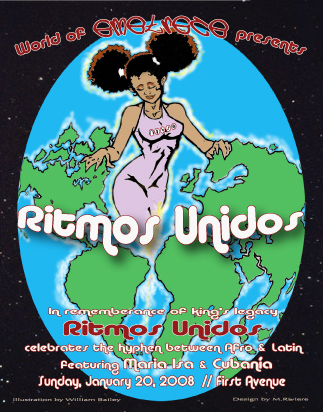
![]()
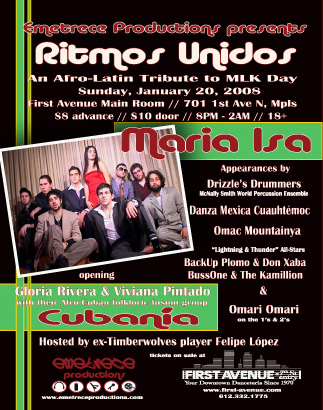
The World of Emetrece Productions presents:
“Ritmos Unidos”
3rd Annual Afro-Latin Tribute to MLK Day
Featuring Maria Isa & Cubanía
Sunday, January 20th, 2008 // First Avenue Main Room
Doors 8PM // Show 9PM – 2AM // $8 Advance // $10 Door // 18+
In remembrance of King’s legacy, “Ritmos Unidos” celebrates the hyphen between Afro & Latin.
Advanced tickets available on-line at First Avenue & Ticketmaster
In contrast to the American ‘One Drop Theory,’ of African racial classification, in Latin America there are various names for differing degrees of Blackness such as prieto, negro, mestizo, mulato, trigueño, or jabao. In general the term ‘Afro’ declaring race has been uniquely hyphenated with nationhood, such as Afro-American, Afro-Cuban or Afro-Brazilian. By ‘celebrating the hyphen’ Ritmos Unidos commemorates something that in Spanish simply doesn't exist - the hyphen. By doing so it educates masses about Latino identity and at the same time recognizes new forms of classification that Latinos appropriate from American paradigms. In Latin American most classifications are based as much on class as they are on race. For example, education or economic success can often times wash out racial classifications.
“Ritmos Unidos” celebrates the hyphen by bringing together Twin Cities’ artists whose musical repertoires are native to Minneapolis and St. Paul, yet speak to their national and racial afro-diasporic legacies.
In the US there flourishes a pan-Latin identity amongst Latino migrants of diverse backgrounds. For example say Panamanians grow up in primarily Latino neighborhood that has a predominant Puerto Rican population, create a unity amongst and between national identities (hyphens) not experienced in their respective homelands. These individuals live the hyphen of being Panamanian Puerto Ricans as an integral part of their American-Latinismo. These new fusions offer new identities reflected through music, religious customs, slang, fashion, etc.
During colonial times only 5% of slaves brought from Africa ended up in North America. Thus, the vast majority of African descendants were transported to Latin America. When we look at Latin America, the Afro-Latin identity is far more complex than in the US. Take for example the Mexican Government's 2005 release of a series of stamps featuring Memin Pinguin, a Jim-crow era sambo figure popularized in 1940’s Mexican comic books. Activists, both domestic and international, have criticized the government’s use of the figure citing it as offensive on a global level. While Mexico’s official response has been a denial of the racist nature of the figure. Mexican officials argue that critics don’t understand Mexican culture and that all Mexicans adore the figure.
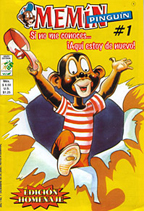
![]()
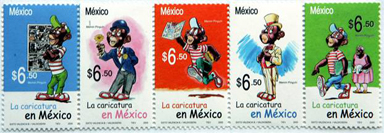
While this controversy raises several important issues about race, one that stands out is the dichotomization of Afro and Mexican that is occurring in the midst of these debates. The fact that people don’t know that black Mexicans exist, doesn’t change the fact that they do, and in fact a small number have begun to organize under the name 'Mexico Negro.' The ‘leaving out’ of black Mexico in this debate, points to a larger failure to incorporate the experience of Afro-Latinos into academic and activist dialogues about race and racism. Celebrating the hyphen means precisely placing a spotlight on this 'no-longer-invisible" identity so that through music and arts we can celebrate existence while educating about its complexities. Combining education with entertainment Ritmos Unidos hopes to bring together artists and audiences through 'edu-tainment' as a platform to consider potential future collaborations, exchanges, edification, and activism.
Ritmos Unidos does not attempt to declare any direct relationship between the biography of Martin Luther King and Afro-Latin ancestry. However King's activism, organization, education, and empowerment of both racial groups and working classes offers a blue print for advocacy and arts amongst Afro-Latinos today.
Race and ethnicity are integral factors in measuring the social exclusion and poverty faced by Afro-descendants in Latin America. There is a strong correlation between race, ethnicity and access to social services such as education and health care (include hygiene and access to clean water/environments), as well as sustainable development initiatives and the empowerment of role models. Latin American nations never experienced a civil rights movement equivalent to that led by King and other activists of his era. As a result many nations have suffered prolonged racial tensions made more complicated by imbedded working class struggles. In Cuba for example, most racial issues were brushed under rhetoric of economic equality propagated by the ideals of the Communist revolution. Only today are increasing numbers of groups forming to tackle race issues. Miscegenation is still seen as a whitening process in Cuba, and race remains merely an underlying theme in contemporary social politics. Cuba’s allegiance with the liberation struggles of Africa, particularly Angola and the Congo, have enforced African identity within and amongst the younger generation of the revolution. And if there is any living non-Cuban figure on the island viewed as a hero it is Nelson Mandela. Yet the underlying themes of an egalitarian society have taken their toll on the lack of images, politics and recognition of race relations through mainstream avenues. In contrast to this example in which racial themes superimpose nationhood over race, take into consideration the example of Afro-Dominicans currently fighting state authorities for the right to be categorized as "Black'' on their passports. In other extremes, Afro-Latin scholars debate as to whether if Afro-Argentineans exists, and if they do whether they are an endangered group - yet in neighboring Brazil over half of the population identifies itself as pertaining to African ancestry.
Hip-hop emerges from the post-civil rights struggle in working class neighborhoods of New York amidst the financial crises of the 1970's. The crises brought together Afro-American and Latino communities based primarily on class segregation. Thereby immediately creating a link between these communities as "non-white." Many of the ideals related in the works of the invited guest artists relates clearly to their struggle for empowerment and equality that originate from this era.
Hosted by former Timberwolves player Felipe López, this year’s “Ritmos Unidos” highlights the local Minneapolis and St. Paul Afro-Latin diversity. Rising Latin hip-hop and reggaetón artist Maria Isa headlines with her ten-piece band, accompanied by opening act Afro-Cuban salsa vocalists Viviana Pintado and Gloria Rivera inaugurating their folkloric fusion group Cubanía. The evening also includes a diverse range of appearances by Danza Mexica Cuauhtémoc; Drizzle’s Drummers: McNally Smith Percussion Ensemble; “Lightning and Thunder” all-stars BussOne & The Kamillion; with Back Up Plomo & Don Xaba; Omac Mountainya; and Omari Omari on the 1’s & 2’s.
FEATURED ARTISTS OF "RITMOS UNIDOS" 2008
Maria Isa
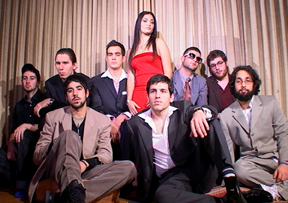
Born and raised in the Twin Cities to Nuyorican parents, emcee, singer, and songwriter Maria Isa is recognized for her dedication towards celebrating her cultural diversity through music and her political activism. Influenced by the traditional Afro-Boricua ritmos of Bomba and Plena, along with Soul and Funk of Motown and Fania’s fusion of Salsa and Bugaloo, Isa plants an organic blend of call and response with lyrical "Spanglish" rhymes through the various drumbeats and snares of Hip-Hop, Reggae, Dancehall and Reggaeton. In 1992 she started her performing arts education at El Arco Iris Center for Arts, forming Raices in 2002 with other advanced students to conserve their ancestral Puerto Rican folkloric music. Joining Emetrece Productions in 2006 to promote her music in the Twin Cities and in Puerto Rico, as well as to study the curriculum of Hip-Hop and Reggaeton, Isa recently released her first independent album M.I. Split Personalities (Emetrece) in May of 2007. Known for delivering her message through a unique flow, many believe Maria Isa to be a young woman with the rays of revolutionizing the next generations of voices. Maria Isa headlines Ritmos Unidos with her twelve piece band and a handful of surprise featured artists.
Maria Isa: www.mariaisa.com & www.myspace.com/mariaisalolita

Cubanía

![]()
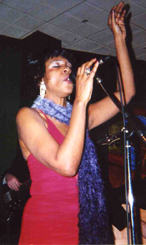
Three-time Latin Grammy nominee pianist and vocalist Viviana Pintado joins singer, songwriter Gloria Rivera to inaugurate their Afro-Cuban folkoric fusion group called Cubanía. Viviana Pintado's dynamic emotional style lights up every performance through her rich vocals and her modern Cuban piano sounds. She has performed with numerous Latin and Cuban bands throughout the country and in the Twin Cities. Gloria, known as the daughter of Cuban composer 'El Niño' Rivera has shared stages with Ricardo Arjona, Irakere, Miriam Makeba and various international artists. Currently both artists thrive as part of the local group Salsa del Soul.
Viviana Pintado: www.myspace.com/vivianapintado

"Lighting and Thunder" All-Stars
The diasporic sounds of dub and reggae music spawned dancehall in Jamaica, hip-hop in New York, reggaespañol in Panama, and reggaetón in Puerto Rico. The DJ, later yielding the role of producer, has been the strongest revolutionizing force of these interlaced musical genres. Whether via compilation CDs or mix tapes which aim to challenge the form by showcasing new artists to their audiences, DJs have encapsulated the changing genres’ street flavor. Producer High Style Kyle offers us a new alternative approach for these genres in Lightning and Thunder. Minneapolis and St. Paul have become artistic niches for artists from strikingly diverse nationalities and cultural backgrounds. Lightning and Thunder is a Spanish and English bilingual production with accents from Spanglish to Patuá. Contributing artists implement lyrical styles that are native to the Twin Cities yet come from Haitian, Puerto Rican, Colombian, Tanzanian, South African, Dominican, Jamaican, Panamanian, Trinidadian, and Costa Rican diasporas.
Lighting and Thunder producer High Style Kyle, alongside Leroy Smokes Band founding members Jesse Lee and Freddy Kruger, synchronize these unique vocal styles and eclectic interpretations of the genres with live compositions of guitar, keyboard, and trumpet arrangements that contain minimal samples. The format of Lightning and Thunder consisting of live production rather than standard various artist collections coutures diverse musicians together not only on the same album, but goes further by joining them as never before on the same tracks together. Lightning and Thunder is by far the most diverse reggae, dancehall, hip-hop and reggaetón compilation published to date representing the diverse global musical roots and production genius of the Twin Cities. Lightning and Thunder all-stars Buss One with The Kamillion and BackUp Plomo with Don Xaba represent and introduce us to Lighting and Thunder this evening at Ritmos Unidos.
The Kamillion: www.myspace.com/thekamillion
Buss One: www.myspace.com/bussoneblackmadonna
BackUp Plomo & Don Xaba: www.myspace.com/backupplomo

Omac Mountainya
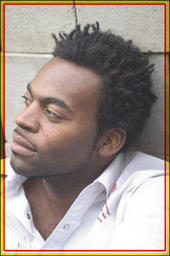
Omaur Bliss performs as "Omac Mountainya" for Ritmos Unidos. Thick layers of instrumentation and beats are a trademark of Omaur's music. Omaur has been an integral part of the Minneapolis and national hip-hop scene, sharing stages with Doomtree, Atmosphere, Kool Kieth, Sage Francis, and the Suicide Kings. Omaura Bliss, performing as Omac Mountainya mixes spoken word with gospel, joining conscious lyrics with soulful melodies.
Omaur Bliss performing as Omac Mountainya: www.myspace.com/omaurbliss

Danza Mexica Cuauhtemoc

Danza Mexica Cuauhtemoc is a community of people dedicated to the preservation and promotion of the Mexica/Azteca culture, ceremonies, warrior dance, accurate history and traditions.
Danza Mexica Cuauhtemoc works to build unity, understanding, mutual respect and harmony amongst all nations. This is done by coming together and supporting one another in struggle for political, economic, environmental, social and cultural justice.
We resist colonization by teaching and practicing the Mexica/Azteca dance, learning the accurate and true history, doings arts and craft, studying the Sun Stone (aztec calendar), study and practice the language of Nahuatl, study Mexica/Azteca and Mayan math, building political consciousness and much more. Basically, we are committed to learning everything we can in our life time that will build our nation.
Danza Mexica Cuauhtemoc: www.cuauhtemoc.org/2007pages/minnesota.html

Drizzle's Drummers
In 1999, the St. Paul (Minn.) Pioneer Press said of Barnell: "The mix of primitive voice and cutting-edge delivery make him perhaps the Twin Cities' most unique, understated solo artist." Since then, Barnell has become much more than a solo percussionist – he has collaborated with dancers and film artists, scored the feature film Strange as Angels and composed music for theatrical performances (Mighty Real: A tribute to Sylvester, The House That Crack Built, Queen Nanny). Recent work with the hit show Dance in the Dark garnered Barnell the label “the best thing in the 2005 Fringe Festival.” Aaron has studied Haitian drumming with John Amira, Ghanaian drumming with Sowah Mensah, and a variety of drumming styles from West Africa, the Caribbean, Brazil, and the Middle East with Marc Anderson. Aaron currently teaches at the McNally Smith College of Music. Drizzle's Drummers incorporates Aaron Barnell with a select crew of his students and friends to create an invigorating percussion cypher for Ritmos Unidos.

Omari Omari on the 1's and 2's
Omari Omari: www.myspace.com/djomariomari
www.thesalsapolice.com

Hosted by Felipe Lopez
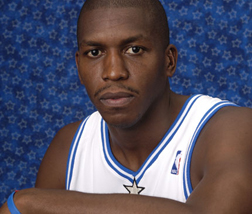
Felipe Lopez, the first NBA player from the Dominican Republic, is one of the most-prominent figures in both the Latino and sports’ communities. Lopez received early national recognition and established a precedent for up-coming young athletes. His talent was so remarkable that even before he played a collegiate basketball game, he appeared on the cover of Sports Illustrated as the top freshmen basketball player in the country. After an illustrious collegiate basketball career, he formed part of the San Antonio Spurs, the Vancouver Grizzlies, the Washington Wizards, and the Minnesota Timberwolves. Lopez suffered a torn-ACL in the 2002-03 preseason, yet re-emerged with the Dallas Mavericks in the 2004-05 preseason. In 2004, Lopez played with the ABA Long Beach Jam and finished overseas with the EWE Baskets Oldenburg. Lopez played with the NBA Orlando Magic for the 2005-06 preseason, and in Spain’s LEB league. The NBA maximizes Lopez’s crossover appeal to both the Latino and domestic demographics due to his highly publicized basketball career by making him a central participant in the NBA Read to Achieve programs, NBA Basketball Without Borders, NBA Cares, and other initiatives from the Dominican Republic, Mexico, Argentina and Brazil.
Felipe Lopez: www.myspace.com/felipelopezfoundation
First Avenue Main Room // 701 First Avenue North, Minneapolis
Info: 612-332-1775 (First Avenue) // 612.281.9970 (Emetrece Productions)
www.emetreceproductions.com // www.first-avenue.com
mriviere@emetreceproductions.com
History of the Emetrece Productions Afro-Latin Tribute to MLK Day:
In 2005 Joyce Bell and Melisa Riviere, graduate students at the U of MN, with their professor August Nimtz, began planning a conference titled "Cimarrones: Conference on Afro-Latin-Indigenous Resistance and Black/Latino Coalition Building." Despite many efforts to acquire funding, the aspiration of the conference became aseries of informal talks and grass roots organizing. In January of 2006, with the new integration of Maria Isa to Emetrece Productions, we hosted the first Afro-Latin Tribute to MLK Day under the name "Ritmos Unidos: Introducing Maria Isa" at Babalu. Accompanying Maria Isa wereLos Nativos, Back Up Plomo, DJ Richy RIvera, Taylor Mallory from Chicago, DJ Wrek, Palabristas, members of Racies & Afri-Caribe and Viviana Pintado. In January of 2007, the event, again held at Babalu, was scaled down and a smaller performance was titled "Ritmos Unidos: Maria Isa Unplugged" - a debut with a full band including HighStyleKyle, Andrew Turpening, Eric Silva-Brenneman, Ivan Fontanez, and Luis elmastripiao, with featured artists Back Up Plomo, VIviana Pintado & Drizzle. In 2008 Ritmos Unidos greatfully moves into the First Avenue Main Room and assures the biggest, baddest, besstess, Afro-Latin Tribute to MLK Day you could image.